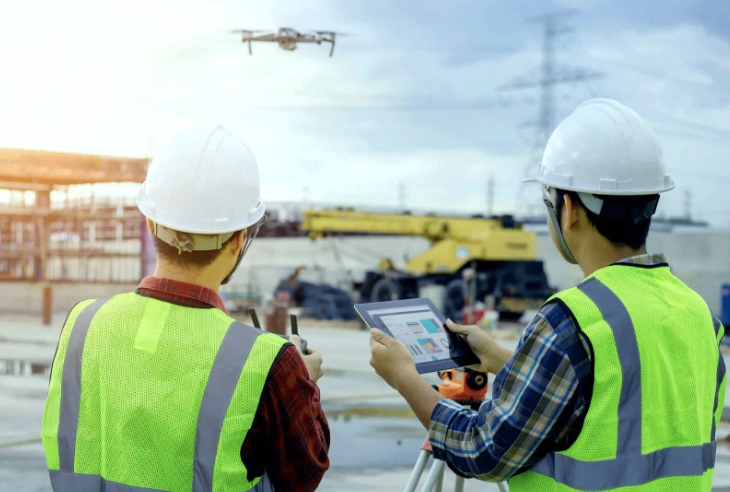AI and Big Data in construction industry

The construction industry, long anchored in traditional methods, finds itself at the crossroads of technological innovation with the emergence of Artificial Intelligence (AI) and Big Data. Traditionally perceived as conservative, it is now asking crucial questions about the future of its methodology. These two concepts, AI and Big Data, although present in the world for decades, are now emerging as unexpected protagonists, suggesting the possibility of a complete digital transformation.
This article explores the implications, challenges and opportunities that these revolutionary technologies bring to the construction industry. Let's decipher how AI and Big Data could reshape the face of this age-old industry, and whether this revolution is here to stay or merely a passing trend.
What is AI and Big Data
Before exploring the implications of Artificial Intelligence (AI) and Big Data in the construction sector, it's essential to clarify these fundamental concepts. A thorough understanding of AI, which enables machines to mimic human intelligence, and Big Data, which refers to the analysis of vast datasets, lays the groundwork for understanding their revolutionary influence on construction industry practices and processes.
Big Data
Big Data is much more than just a large amount of data. It's a sea of information too vast and complex to be captured by traditional database management methods. In other words, it's the massive consolidation of data from a variety of sources, creating an information landscape of colossal proportions. This data can range from historical documents to real-time data, forming an invaluable reservoir of information.
Artificial intelligence (AI)
AI has a history dating back to the 1950s, when visionary minds speculated about the possibility of creating an intelligent machine capable of replicating human behavior. However, the road to realizing this aspiration was littered with initial challenges and complications. It was only much later, with the advent of machine learning algorithms, that AI really took off. These algorithms enable machines to learn from huge quantities of data, representing a major turning point in the development of AI.
Thus, Big Data and AI are converging to create a powerful synergy, offering infinite prospects for construction and other industries. Understanding them is crucial to fully appreciate their potential impact on the future of construction.
How AI and Big Data redefine construction industry ?
The construction industry, long known for its resistance to change, finds itself at the epicenter of a major transformation driven by the advent of Artificial Intelligence (AI) and Big Data. This evolution, far from being a passing trend, signifies a significant shift in how the sector approaches the planning, execution, and management of complex construction projects.
AI in construction: explosive growth
The rapid advancement of Artificial Intelligence (AI) in the construction domain is undeniable, as evidenced by impressive figures from the Global Opportunity Analysis and Industry Forecast. In 2021, the AI in construction sector was valued at a remarkable $496.4 million. However, what is even more striking is the projected staggering growth, catapulting this figure to an estimated $8.6 billion by 2031, with an anticipated Compound Annual Growth Rate (CAGR) of 34.1%.
This exponential growth cannot be overlooked, as it signifies a swift and substantial adoption of AI in an industry traditionally rooted in conventional working methods. Construction companies increasingly recognize the added value that AI brings to every stage of the process, from design to execution, to project management. This shift towards increased utilization of AI is explained by its ability to enhance operational efficiency, anticipate potential challenges, and optimize resources, thereby transforming how projects are envisioned, planned, and executed.
AI is rapidly becoming an essential catalyst for innovation in construction, providing intelligent solutions to the sector's complex challenges. This evolution marks a significant turning point, propelling the industry into an era where technology is not just an advantage but a necessity to remain competitive in an ever-changing environment.
Big Data in construction: a foundational pillar
Similarly, Big Data emerges as a fundamental pillar in the ongoing transformation of the construction industry. With a market forecast estimated by Global Opportunity Analysis and Industry Forecast at $99.31 billion by 2031, Big Data offers more than just a massive accumulation of data. It is a strategic resource that opens new horizons, revolutionizing how construction projects are planned, executed, and optimized.
This wealth of data goes beyond quantity, emphasizing the quality of the insights it provides. Companies in the sector now have access to in-depth, real-time analyses fueled by datasets that were once inaccessible. This valuable information enables more informed decision-making, anticipation of potential challenges, and process optimization, creating an environment conducive to efficiency and innovation.
Big Data is not just a set of numbers; rather, it is a key that opens the door to more precise planning, proactive project management, and judicious resource allocation. It transforms traditional methods by offering a profound understanding of trends, patterns, and forecasts, helping industry players navigate successfully in an increasingly complex landscape. By integrating Big Data into their processes, construction companies position their future on a trajectory of sustainable success and continuous innovation.
In summary, AI and Big Data are not merely abstract technological concepts; they are the driving forces behind a profound transformation within the construction industry. Their gradual integration redefines standards and paves the way for an era of smarter, more efficient, and adaptable construction.
The impact of Artificial Intelligence (AI) and Big Data on the construction industry extends beyond technological evolution, translating into tangible benefits and transformative opportunities. Let's explore how these innovations shape the future of construction by offering innovative solutions and fresh perspectives.
What are the advantages and opportunities of AI and Big Data in construction?
These transformative technologies, Artificial Intelligence (AI) and Big Data, bring forth a myriad of advantages, fundamentally reshaping the landscape of the construction industry. Their integration offers a multitude of benefits, ranging from heightened security and efficiency to an increased focus on sustainability. Let's delve into how these advancements create unprecedented opportunities for the construction sector:
Data collection and utilization
AI and Big Data enable robust data collection and utilization, empowering construction companies with valuable insights for informed decision-making. The ability to harness and analyze vast datasets enhances the industry's capacity to predict trends, address challenges proactively, and optimize project outcomes.
Innovative technologies
The adoption of AI and Big Data fosters the development and implementation of innovative technologies in construction. From advanced project simulations to predictive analytics, these technologies drive innovation, offering new ways to approach design, planning, and execution.
Project management optimization
AI and Big Data contribute to the optimization of project management in construction. Real-time analytics, predictive modeling, and automated decision support systems enhance project planning, scheduling, and coordination, leading to more efficient and successful project outcomes.
Resource management
The integration of AI and Big Data facilitates improved resource management in construction. From materials and equipment to workforce allocation, data-driven insights enable better decision-making, reducing waste, and enhancing overall resource efficiency.
Enhanced security measures
The implementation of AI and Big Data introduces advanced security protocols, safeguarding critical construction data. With the ability to identify and mitigate potential risks in real-time, these technologies fortify the industry against cyber threats, ensuring the confidentiality and integrity of sensitive information.
Streamlined efficiency
Construction companies, custodians of vast data reservoirs, experience a paradigm shift in efficiency through the integration of Big Data. This transition facilitates expedited and simplified access to colossal datasets, empowering swift and informed decision-making. From project planning to execution, the streamlined processes enhance overall operational efficiency, reducing delays and optimizing resource allocation.
Sustainable practices
AI and Big Data contribute significantly to the sustainability endeavors of the construction sector. By analyzing and interpreting environmental data, these technologies enable construction companies to make eco-conscious choices. From selecting sustainable materials to optimizing energy consumption, the integration of AI and Big Data fosters a more environmentally responsible approach, aligning the industry with global sustainability goals.
Rapid problem resolution
The marriage of AI and machine learning expedites problem resolution within the construction realm. Complex calculations that traditionally consumed substantial time can now be unraveled swiftly. AI algorithms, through continuous learning, adapt to challenges, offering innovative solutions and mitigating issues before they escalate. This acceleration in problem resolution contributes to project timelines and cost-effectiveness.
In essence, the amalgamation of AI and Big Data in construction transcends theoretical concepts. It ushers in a new era where these technologies become instrumental in addressing longstanding challenges and fostering innovation. The advantages they bring forth, from fortified security to sustainable practices, position the construction industry on a trajectory of enhanced efficiency and resilience. As construction continues to embrace these advancements, the sector is poised to navigate the complexities of the modern world with greater agility and foresight.
What are the challenges and limits of using AI and Big Data?
While the integration of Artificial Intelligence (AI) and Big Data in the construction industry brings forth substantial advantages, it is essential to acknowledge and navigate the challenges and limitations that accompany these transformative technologies.
Technologies integration
The integration of AI and Big Data requires seamless collaboration among diverse technologies, software, and platforms. Achieving compatibility and standardization in this diverse landscape poses a challenge. Ensuring that these technologies work harmoniously and contribute synergistically to construction processes necessitates careful planning and strategic implementation.
Data quality
Maintaining high-quality data is critical for the effective functioning of AI and Big Data applications. Challenges related to data accuracy, completeness, and consistency may arise, impacting the reliability of insights generated by these technologies. Construction companies must implement rigorous data quality assurance measures to enhance the dependability of the information driving decision-making processes.
Data security concerns
One of the primary challenges revolves around ensuring the security of the vast datasets central to construction projects. The accumulation of sensitive information, if not adequately protected, poses a risk of unauthorized access and data breaches. Safeguarding against cyber threats and implementing robust encryption protocols becomes imperative to maintain the integrity and confidentiality of project-related data.
Accuracy of information
The accuracy of data utilized is another critical consideration. Despite the wealth of information provided by Big Data, there is a potential risk of incorporating inaccurate or outdated data into decision-making processes. Such inaccuracies can lead to errors in decision-making, adversely impacting project outcomes. Establishing rigorous data validation mechanisms is crucial to mitigate this risk and enhance the reliability of insights derived from AI and Big Data analytics.
Ethical implications
The ethical implications surrounding privacy and security in the utilization of AI and Big Data cannot be overstated. The collection, storage, and analysis of extensive personal information raise concerns about how this data is accessed, shared, and protected against breaches. Clients may express reservations about the use of their personal data for targeted advertising or third-party sales. It is incumbent upon construction companies to ensure transparency in data handling, implement stringent privacy policies, and establish robust security measures to address these concerns.
Transparency and risk avoidance
Maintaining transparency in the utilization of AI and Big Data is paramount to building trust with clients and stakeholders. Construction companies must address concerns related to data transparency and privacy by openly communicating their data handling practices and security measures. Proactive risk management strategies should be in place to avoid potential pitfalls associated with data breaches and ethical dilemmas.
In summary, the advantages of AI and Big Data integration in construction come hand in hand with challenges that demand careful consideration. Data security, accuracy, and ethical implications necessitate a proactive and vigilant approach. By addressing these challenges head-on and implementing robust risk mitigation strategies, the construction industry can harness the full potential of AI and Big Data while ensuring the integrity and security of project-related information
Navigating the future with AI and Big Data in construction
In conclusion, AI and Big Data stand as transformative forces with the potential to redefine the construction industry. While challenges in data security, accuracy, and ethical considerations must be addressed, embracing these technologies presents an unparalleled opportunity for the construction sector. By adopting AI and Big Data, the industry can not only enhance operational efficiency, transparency, and accountability but also position itself at the forefront of innovation in the digital era.
The progressive integration of AI and Big Data is not merely a technological evolution; it is a paradigm shift that reshapes standards and opens the door to a smarter, more efficient, and adaptable era in construction. The construction sector's willingness to embrace and leverage these advancements will be pivotal in determining its success and competitiveness in an ever-evolving landscape. As we navigate the future, the synergy between human expertise and technological prowess, embodied by AI and Big Data, promises to usher in an era of construction that is both dynamic and responsive to the challenges of tomorrow.




 Metam
Metam